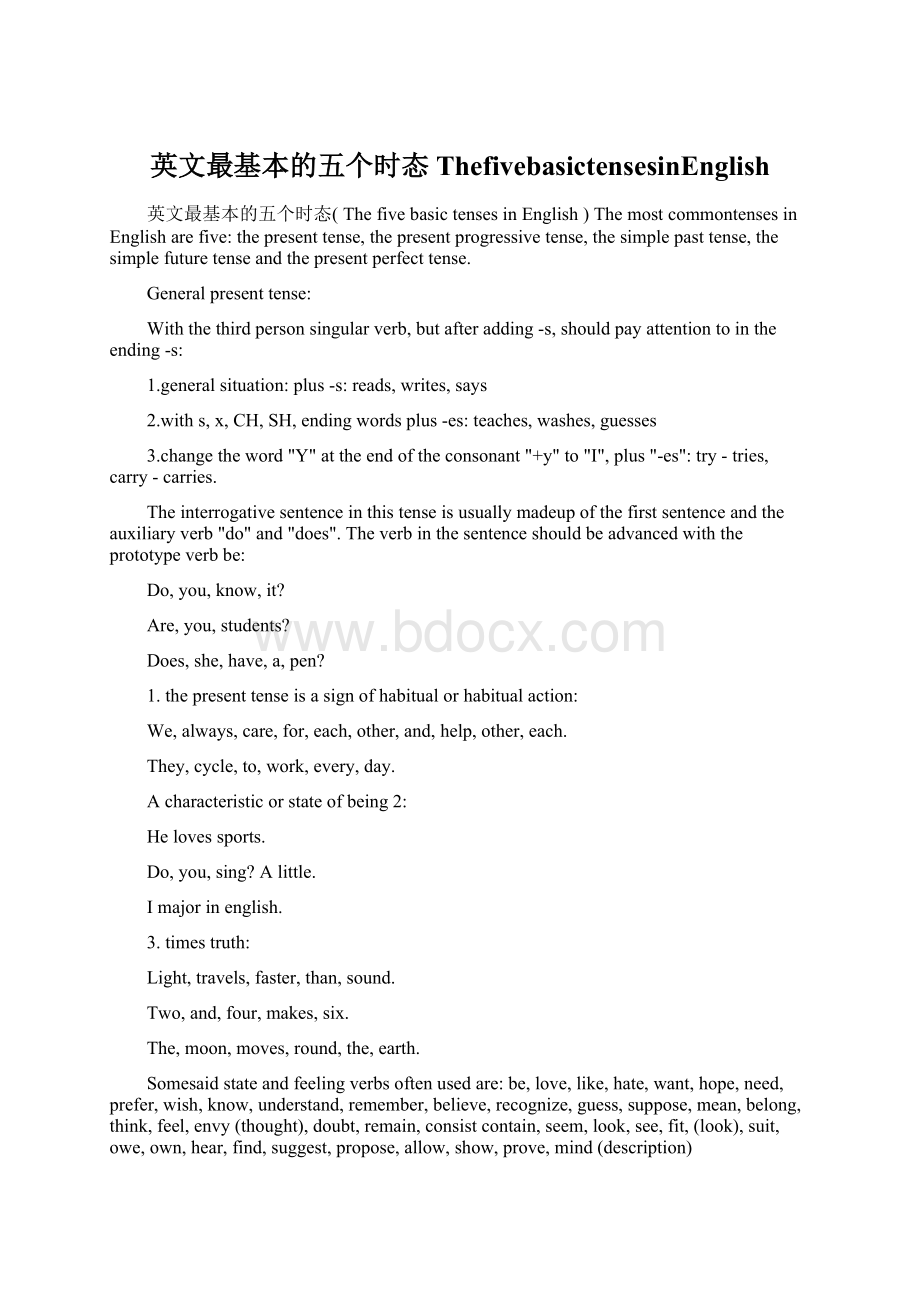英文最基本的五个时态ThefivebasictensesinEnglishWord格式文档下载.docx
《英文最基本的五个时态ThefivebasictensesinEnglishWord格式文档下载.docx》由会员分享,可在线阅读,更多相关《英文最基本的五个时态ThefivebasictensesinEnglishWord格式文档下载.docx(12页珍藏版)》请在冰豆网上搜索。

does"
.Theverbinthesentenceshouldbeadvancedwiththeprototypeverbbe:
Do,you,know,it?
Are,you,students?
Does,she,have,a,pen?
1.thepresenttenseisasignofhabitualorhabitualaction:
We,always,care,for,each,other,and,help,other,each.
They,cycle,to,work,every,day.
Acharacteristicorstateofbeing2:
Helovessports.
Do,you,sing?
Alittle.
Imajorinenglish.
3.timestruth:
Light,travels,faster,than,sound.
Two,and,four,makes,six.
The,moon,moves,round,the,earth.
Somesaidstateandfeelingverbsoftenusedare:
be,love,like,hate,want,hope,need,prefer,wish,know,understand,remember,believe,recognize,guess,suppose,mean,belong,think,feel,envy(thought),doubt,remain,consistcontain,seem,look,see,fit,(look),suit,owe,own,hear,find,suggest,propose,allow,show,prove,mind(description)
(care),have(a),sound(sound),taste(taste),matter,require,possess.Desireandsoon.
I,feel,a,sharp,pain,in,my,chest.
The,soup,contains,too,much,salt.
You,see,what,I,mean?
The,coat,fits,you,very,well.
How,do,you,find,the,book?
Someverbsthatexpressactionsaresometimesusedinthistensetoindicatetheactionofthemoment.Becauseoftheshortdurationofthemovement,itisnotnaturaltouseit:
I,send,you,my,best,wishes.
Isaluteyourcourage.
Now,I,extend,my,heartfelt,thanks,to,you.
Inspokenlanguage,thistenseisusedtoindicateasituationinaccordancewitharule,plan,orarrangement(whichhasanadverbialofthefuture):
When,do,the,train,leave(stop,at,Jinan)?
The,plane,take,off,at,11,am.
Tomorrowissaturday.
Is,there,a,firm,on,tonight?
Butthisisrestrictedtoafewverbs,suchasbegin,come,go,leave,sail,start,arrive,return,dine,end,be,stop,depart,open,close,etc..Inaddition,intimeorconditionalclauses,futureactionsorstatesareexpressedinthistense:
Tell,her,about,that,when,she,come.
Turn,off,the,light,before,you,leave.
We'
ll,start,as,soon,as,you,are,ready.
Inspokenlanguage,thistensecansometimesbeusedtoindicateanactionthathasalreadyoccurred(thetimeittakestospeakisinaveryunimportantpositioninthehumanbrain):
They,say,Xiao,Wu,is,back.Is,that,true?
Xiao,Yu,tells,me,you,re,going,abroad.
Oh,I,forget,where,he,lives.
Yes,you,answer,quite,well.
Inaddition,thegeneralpresenttimeisalsousedinnewspapers,movies,TVcommentaryandsoon.
Two,thepresentcontinuoustense
Thepresentcontinuoustenseismadeupoftheauxiliaryverbbe'
spersonalformandthepresentparticiple,anditsaffirmative,negativeandinterrogativeformsareasfollows:
Iamworking.
Iamnotworking.
Am,I,working?
Thepresentcontinuoustenseisthemovementofthepresentorpresentstage.
Where,are,they,having,the,basket-ball,match?
They,are,putting,up,the,scaffolding.
He'
s,showing,a,foreign,guest,round,the,city.
Inmanycases,aChinesesentencethatindicatesanongoingactiondoesnothavetheword"
being"
butmustbeusedintheprogressivetensewhenitistranslatedintoenglish:
How,are,you,getting,on,with,the,work?
The,work,is,going,fairly,smoothly.
You,are,making,rapid,progress.
Itisblowinghard.
你在等谁?
我每次见到她时,她正在花园里干活。
我每次看到她时,她总是在花园里干活。
在一般现在时所列的表示状态和感觉的动词,一般不能用于进行时态,因为他们不能表示正在进行的动作。
但如果词义转变,能表示一个正在进行的动作,就能够用于进行时态,试比较下面的句子:
你看到那里有什么人吗?
你看到有人了吗?
你在给谁送行吗?
我听见有人唱歌。
他们在听一个英语说话吗?
他们在听一个英语报告。
你认为呢?
你觉得这怎么样?
你在想什么呢?
你在想什么?
另外,表示无法持续动作的动词,一般不宜用于进行时态,但有些可以用于这个时态表示重复、即将等:
他跳上跳下。
她一上一下地跳着。
火车就要进站了。
老人快要死了。
老头病危了。
现在进行时有时可用来表示一个在最近按计划或安安排要进行的动作(这是多有一个表示未来时间的状语):
我们星期五动身。
你明天要去什么地方吗?
今天下午一个外国客人的英语演讲。
小红!
快来。
谁为你翻译?
我们下星期一放假。
但这仅限于少量动词,如走,来到,离开,出发,到达,午餐,返回,吃饭,工作,睡觉,呆,玩,做,有,穿等。
另外,“会+不定式”这个结构经常用来表示即将发生的事或打算(准备)做的事:
恐怕要下雨了。
明天会相当冷。
她不打算在会上发言。
在这个结构中过去有许多人不赞成用去和来这两个动词,感到很别扭,主张不说你要去什么地方吗?
而说明天你要去哪里?
不说她会来吗?
而说她要来吗?
但现在在这种结构中用两个动词的人越来越多,这种用法基本上被大家接受了。
此外,在时间和条件状语从句中,间或也可用现在进行时表示将来的情况或一般情况:
不要说你和他谈话时记住,当你休息,别人总是在工作如果她还在睡觉,不要吵醒她。
现在进行时有时用来代替一般现在时,表示一个经常性动作或状态,
这是或是为了表示一种感情
(一)如赞叹、厌烦等,或是为了强调情况的暂时性(B)。
答:
你今天感觉怎么样?
(比你今天感觉如何?
更显亲切)萧华在学校里表现很好。
(比小华在学校。
更富赞美工作做得好)他总是想着他的工作。
表赞许他经常把他的事。
她老是乱扔东西(表不满)。
他总是吹牛。
他老爱说大话(表厌烦)。
他现在正在隔壁房间睡觉。
他现在现在是在隔壁房间睡了(不再原来房间睡了)。
教授自己打信秘书生病时。
他在哪里工作?
他现在在那里工作(可能刚换工作)?
本周我们7:
30开始工作。
他是步行去上班,因为他的自行车在修理。
是间或可用于进行时态,表示一时的表现:
你不谦虚。
他在犯傻。
她很友好。
小红今天是个好女孩。
谈不rot.i很严重。
注:
在有和这里引起的句子中,
continuous
difference:
Oftenusedinthepresentageinsteadofthepresenttense:
Herecomesthebus.(=the,bus,is,coming.)
There,goes,the,bell.(=the,bell,is,ringing.)
Insomecases,twocasesareavailable,withlittle
Iwonder(amwondering)how,I,should,answer,then.
Does,your,leg,hurt,is,your,leg,hurting?
)
Ititches(isitching)terribly.
My,back,aches(is,aching)
I,write(am,writing),to,inform,you.
Three,thegeneralfuturetense
Thegeneralfuturetenseismadeupoftheauxiliaryorwillplustheverbprototype,shallisusedinthefirstpersonandwillisusedinthesecond,thirdperson.Theaffirmative,negativeandinterrogativeinstitutionsofthistensecanbeexpressedasfollows:
Ishallgo.
Ishallnotgo.
Shall,I,go?
InanEnglishspeakingcountryotherthanBritain,inthedeclarativesentence,eveninthefirstperson,willisusedingeneral,too.InBritain,thistendencytendstotoI'
ll.inthespokenlanguage
Thegeneralfuturetenseindicatestheactionsandcircumstancestotakeplace:
Iwill(shall)arrivetomorrow.
Will,you,be,busy,tonight?
The,agreement,will,come,into,force,next,spring.
verbshall
bereduced
We,won,t(Shan,t),be,free,tonight.
Sometimesitindicatesthetimeadverbialofthefuture,andsometimesthereisnotimeadverbial.Atthispoint,weshouldjudgefromthemeaningwhethertheactionorsituationwillbeinthefuture:
I,will,think,it,over.
Who,will,take,the,chair?
Will,she,come?
Theywon'
t,object,it.
InaquestionwithIorweasthesubject,shallisusuallyused,eitherbyaskingfortheotherperson'
sopinion(a),orbyaskingacase(B):
A.,shall,I,make,a,fair,copy,of,it?
Which,book,shall,I,read,first?
Where,shall,we,meet?
B.,shall,we,have,any,classes,tomorrow?
When,shall,we,have,the,rehearsal?
Shall,I,be,able,to,find,them,there?
Inthesequestions,manypeoplehaveusedwillinrecentyears,especiallyintheUnitedstates.
What,will,we,do?
How,will,get,there?
Which,will,I,take?
Notethatintheadverbialclausesoftimeorcondition,thepresenttensecannotbeusedinthepresenttenseinsteadofthepresenttense:
I'
ll,let,you,have,the,book,when,I,m,through.
They,ll,fight,till,they,win,complete,victory.
ll,be,round,to,see,you,if,I,,have,time,tomorrow.
Note:
inthetwocase,conditionalclausescanbeusedinthegeneralfuturetense:
1.meanswishes:
If,they,won,t,cooperate,our,plan,will,fall,flat.
2.themainpredicatetablepresentsituation:
If,he,won,t,arrive,this,morning,why,should,we,wait,here.
Theactionorsituationthatwilloccur,inadditiontothegeneralfuturetense,therearesomeotherstructuresand
tenses:
1.begoing+infinitive(aplanintendedorintendedtodoorsomethingthatisabouttohappenorsuretohappen):
re,going,to,put,up,a,building,here.
How,are,you,going,to,spend,your,holiday?
Who,is,going,to,speak,first?
2.be+infinitive(indicatingwhatisgoingtohappenasplannedorusedtoseekadvicefromtheotherparty):
When,is,the,factory,to,go,into,production?
The,line,is(going),to,be,opened,to,traffic,week.,next
Am,I,to(=shall,I),go,on,with,the,work?
3.thepresenttense(limitedtocertainverbsthatindicateswhatisplannedorwhatwillhappenatanymoment):
School,finishes,on,January,18th.
We,get,off,at,the,next,stop.
When,does,the,winter,vacation,begin?
4.presentcontinuoustense(limitedtocertainverbsthatindicateswhatisgoingtohappenasplanned):
We,are,having,an,English,evening,tonight.
They,are,playing,some,folk,music,next.
I,am,talking,the,children,to,the,zoo(on,Sunday)
Insimplyexpressingthefuture,especiallyinaseriesofthings,orinasentencewithadverbialclausesoftimeorcondition,thepredicateusesthefuturetense:
Next,term,I,will,to,do,better.,I,ll,speak,try,more,
English,and,,do,more,reading-aloud.
He,ll,come,to,see,you,when,he,time.,has,...
He,ll,tell,you,if,you,ask,him.
Whenexpressing,planning,orpreparing,usethebe,going,andtostructureswithoutmentioningtime,conditions,etc.,
Lessoftenthanusual,especiallyinspokenenglish:
He,is,going,to,buy,a,dictionary.(he,will,buy,a,dictionary.)
Intalkingaboutwhatisgoingtohappen,thebegoingtoismorestructured.Whenitcomestoplanningtodowhatyouwant
todo,usebetoquiteabit.Thereisalsothefutureprogressivetense,whichcanalsobeusedtoindicatefutureactions.
be,